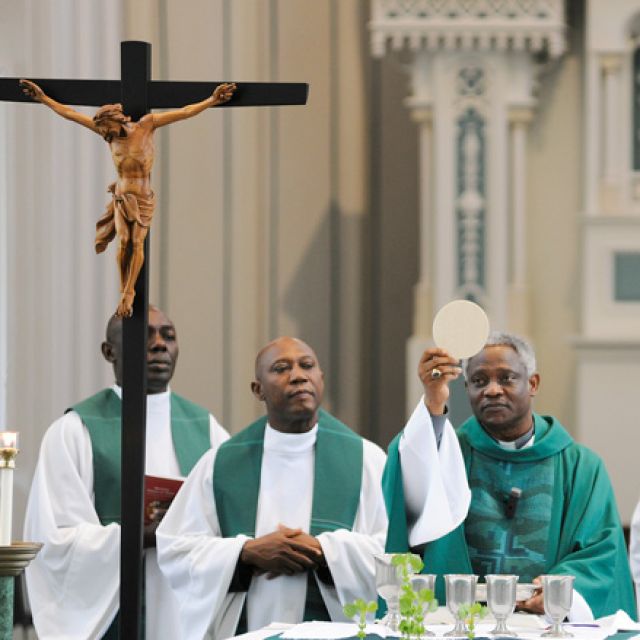Cardinal Turkson gave the English keynote address at the bilingual conference. More than 500 people from three states attended the third annual daylong event at the New York Catholic Center. Mexican Archbishop Carlos Aguiar Retes, president of the Latin American bishops' council, delivered the Spanish keynote.
"The Bible is a means of letting the solo tune of Jesus fill the whole symphony of human history," Cardinal Turkson said.
Listeners nodded in agreement when Cardinal Turkson said it was unusual for Catholics to open a Bible before Vatican II. They listened to the word of God at Mass and heard it explained in homilies and the catechism, he said. "Dei Verbum," the council's document on divine revelation, opened Bible ministry to Catholics and urged them to be informed Christians by venerating God's word.
"The Bible is one of the gifts that God has given to the church," he said.
Cardinal Turkson said "Dei Verbum" characterized Blessed John XXIII's intention that Vatican II be pastoral and ecumenical. He said the council called for a change in the style of church communication and a move toward Christian unity. "Instead of appearing as the prophet of doom, the church would offer a message of hope," he said.
"Dei Verbum" affirmed revelation as God's loving communication, underscored the relationship between Scripture and tradition, and insisted that all Christians should have easy access to Scripture, Cardinal Turkson said.
The cardinal said Pope Benedict XVI affirmed and deepened the themes of "Dei Verbum" in his apostolic exhortation "Verbum Domini" ("The Word of the Lord") and linked the Bible to the wider mission of the church. "There is nothing more consistent with the word of God than to have a commitment to social justice," he said.
Cardinal Turkson said the pope considers liturgy the privileged place to proclaim the word of God and connects love of the Bible with commitment to the poor. The church has a mission to spread the word to the world and the poor are the first ones entitled to hear the proclamation of the Gospel, he said.
"The Bible shares something of the nature of Jesus," Cardinal Turkson said. "The Bible is the word of God, but the work of man; Jesus is the word of God, but the son of Mary."
Cardinal Timothy M. Dolan of New York presided at the summit's opening liturgy. The principal celebrant and homilist was Archbishop Carlo Maria Vigano, apostolic nuncio to the United States.
Archbishop Vigano acknowledged the feast of the Immaculate Heart of the Blessed Virgin Mary. He said summit participants might be inspired "to rediscover a taste for feeding ourselves on the word of God, faithfully handed down by the church and, like Mary, to ponder it over and over again in our hearts, allowing them to be shaped by transforming grace."
Archbishop Vigano said Mary has shown herself "through the centuries in extraordinary apparitions, giving each time a particular message for us to go deeper in pondering the mysteries of Christ in our hearts." He said Mary's apparitions are an expression of her affection and seem to occur at times when the people of God are in particular difficulty.
He said Mary described herself as the Virgin of Revelation when she appeared with a Bible in her hands in Rome in 1947 to Bruno Cornacchiola, a virulently anti-Catholic communist who plotted to assassinate Pope Pius XII. After seeing Mary, Cornacchiola changed his life, returned to Catholicism and founded an association of catechists.
Archbishop Vigano said the timing of the apparition "just a few years before the Second Vatican Council" seemed to foreshadow the new attention accorded the Bible at the council.
The Catholic Bible Summit was co-sponsored by the Catechetical Office of the Archdiocese of New York and the American Bible Society. The event marked the 50th anniversary of the opening of Vatican II and had as its theme "Joy and Hope in the Light of the Gospel."


